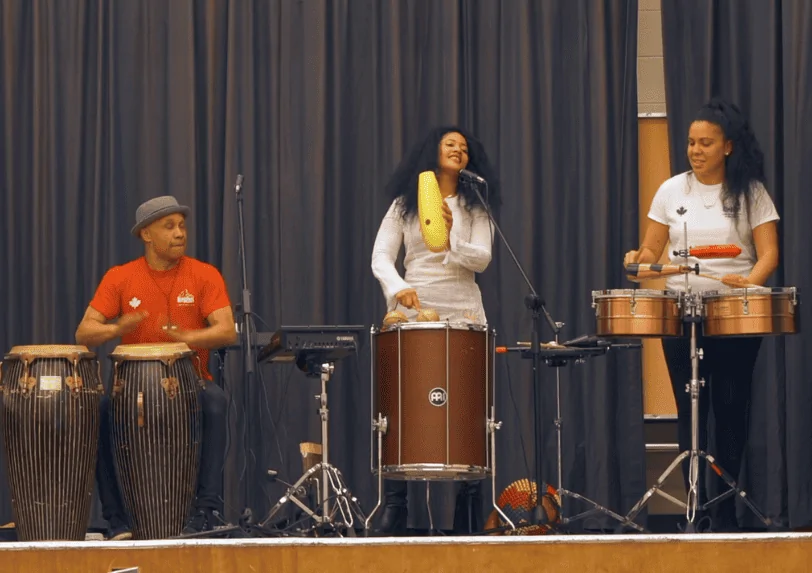Happy International Arts Education Week!
As advocates for arts education, we know that it is an essential part of education, and we believe that engaging with art is essential to the human experience. Yet, when it comes to funding school experiences, the arts is frequently (if not always) given the lowest priority.
The World Alliance for Arts Education encourages us to give arts education a ‘life line’; to advocate for the future of arts for children and youth; to reflect on our aims for arts education in your community.
They ask What will you do to fight for arts education?
We would like to imagine a province where every young person has access to educational, high-quality performing arts experiences. With this in mind, we have written this resource as a tool that can be used as a ‘life line’ to advocate for arts education and ensure that it does not slip entirely from your school curriculum.
Making the case for arts education:
When we experience the arts together, we feel more connected and included.
Arts and culture help build community. Bringing performing arts experiences into your school can strengthen the character of its community. The arts brings people together, both physically and culturally. Audiences feel connected over shared stories or brand new experiences.
We had Joaquin Nuñes and the Rumberos gift us with their vibrant music and rhythm! All staff and students were amazed and engaged throughout the entire performance. At Blaydon we have many students with special needs and it was heartwarming to see those students engaging and smiling throughout the performance. Highly recommend this group, they are amazing!
– Blaydon PS, TDSB

Arts education inspires creativity and expression
Experiencing the arts can improve self-esteem, help develop communication and collaboration skills, inspire young people to try new things. These are all important factors for fostering creativity and freedom of expression.
My students were pretty shy and quiet so I was concerned that they were not into it. At recess for the next three days though, a large group of them asked to stay in and work on a song. In the end they recorded: We Don’t Talk About Bruno and sent it home to parents. It was amazing and this was sparked by your workshop. Thanks so much.
– Foley Catholic School Teacher about David Lane’s “You Can Beatbox” workshop
Arts education articulates and activates culture and can help build students’ capacity for intercultural understanding, empathy, and mutual respect.
Art is a great vehicle for exploring diverse (and sometimes new) topics, themes, and cultures, and can help everyone feel valued and included. Representation is an important part of standing against all forms of racism, discrimination, and bullying. Bringing performing arts experiences into your school can help create inclusive spaces for young people to feel more engaged with their school community.
Not only was the performance engaging but it was immensely educational! My students and I were in awe and we learned so much. After the performance, as a classroom, we discussed our understanding… Our classrooms’ biggest takeaway was that the performance was more than just dancing and singing but First Nations peoples’ culture, history, storytelling, and sharing and customs. My students made further connections in their own lives by also sharing their traditional clothes, music, beliefs, food, and other customs. Overall, it was wonderful!
– Cherokee Public School, TDSB about Tribal Vision Dance
Arts education can play a valuable role in improving mental health; it can boost confidence, alleviate stress, and promote empathy.
The Canadian Network for Arts & Learning shared research surrounding this claim; Supporting Youth Mental Health in and through the Arts. The study shows that the arts impacts mental health in four areas:
- Relieving stress and promoting mindfulness
- Building resilience
- Developing, exploring, and empowering identities
- Enhancing social connectedness and inclusion
Arts programs can help develop young people’s identities, as well as empower and encourage awareness of diverse identities within society.
The following testimonial is about The ADHD Project presented by Squirrel Suit Productions. In this one-person show, Carlyn Rhamey shares their experiences of growing up with ADHD and celebrates all forms of neuro-diversity.

There was so much positive feedback from Claude Watson Staff about your performance and just how good it was. I personally thought the highlight was when you lit up your “brain” using the string light analogy. Your storytelling varied intelligently and skillfully – from funny, to thought-provoking, to invoking empathetic reactions from the students. Their engagement was evident, and the multiple questions asked showed how much they wanted to know more; it was tough to bring the questions to a close. Thank you so much from the drama department and the whole school!
– Claude Watson School for the Arts Teacher
Funding Opportunities
We all know the biggest barrier when it comes to keeping the arts alive in your school is funding.
Prologue’s Possibility Program subsidizes performances and workshops in schools that are identified as underserved and addresses issues of equity caused by limited school arts budgets.
Prologue has partnered with Daytrippers Children’s Charity in order to support schools that face barriers with funding. This partnership allows schools to apply for additional funding to support their Prologue performance or workshop through an application process.
Many school boards offer special funding as well for specific programs that help support the curriculum, such as Indigenous education, French education, and equity and inclusion. Look into cultural funding through your school board and we can help match an incredible program with any funding stream.


